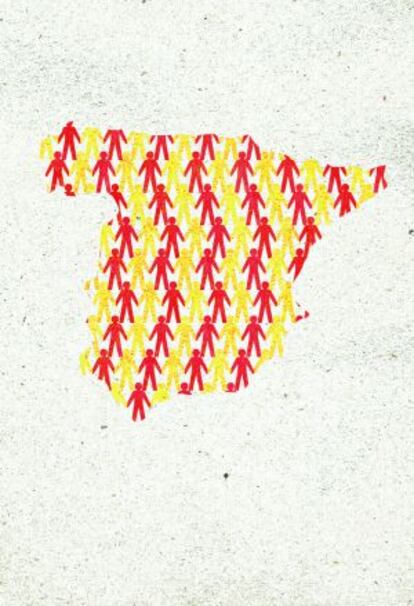To the Spanish
Regional premier Artur Mas and his fellow supporters of an independent Catalonia respond to Spanish ex-PM Felipe Gonz¨¢lez¡¯s open letter ¡®To the Catalans,¡¯ published in EL PA?S

It takes a lot of nerve to give lessons on democracy to the Catalans. But to do so by evoking the worst that has happened to Europe, comparing sovereignty to Nazism, in order to attack the firmest, most widespread, civic and democratic expression of will on display in that same Europe is highly irresponsible. Such provocation shows how far we have come. This is the saddest thing about the incendiary libel signed by former prime minister Felipe Gonz¨¢lez.
This is an occasion when we might apply the old saying of ¡°sticks and stones¡± were it not for the fact that in this case we are dealing with a leader of a long-established democratic party. The author of the text is an illustrious figure who was once the head of the party that represents the alternative to the Popular Party in Spain. And that is the most worrying thing about the situation: the main Spanish parties share the same discourse and strategy over Catalonia. The same recipe as always, with no attempt to disguise it.
Catalonia has loved Spain and continues to love it. Catalonia has enjoyed solidarity and fraternity with Spain and with Europe. And in the case of Spain, it has done so despite the absence of reciprocity, always working for a rational and productive economy, an infrastructure at the service of economic needs, at the service of the people, of prosperity, working tenaciously to improve living conditions based on a fairer and freer society.
This is what September 27 is about: deciding if we want to create a new Catalonia or to follow the same old path
Catalonia has loved liberty over all else, with passion; indeed such has been our love of it that at several points in our history we have paid a high price in its defense. Catalonia has resisted all kinds of dictatorship, dictatorships that have not just tried to bury the culture, language and collective institutions of the country. Catalonia has always risen up against injustices of all kinds, and against unfairness. Catalonia has loved despite not being loved, has helped despite not being helped, has given much and received little or nothing: the crumbs, if not the disdain of governors and governments. And despite all these circumstances, Catalanism, as the expression of the majority today, has responded once and again, by offering its hand and addressing all types of nonsensical proposals by governments and governors. Catalonia has persisted in offering collaboration and dialogue in the face of impositions, and has avoided, in spite of everything, to respond to grievances by heightening tension.
For centuries, Catalonia has looked for a way to fit into the rest of Spain. One could almost say that this search is part of the nature of our politics. But when a court put a ruling ahead of a vote, when for four years the dignity of our institutions was insulted, when every door was closed, one after another, with the same coarse refusal, the majority of Catalans believed that another solution had to be found.
But bad times do not last forever. There was no way we could go on like this, for the good of all. This is why a longing of hope has hatched in Catalonia, which has run through the country from north to south, from east to west, a breath of fresh air that proposes the democratic challenge of building a new country, of all, for all, if that is the desire of the majority, expressed freely by the Catalan citizenry. In fact, this is the democratic test shared naturally by the immense majority of Catalan society, to decide on the future of Catalonia by voting and assuming the citizenry¡¯s mandate, whatever it is. And if the citizens manifest their desire in this way, to create a new state that establishes relations on an equal footing with our neighbors, especially Spain.
Fortunately, Catalonia is a strong society, plural and cohesive. And it will continue to be so, despite the doom-laded predictions expressed so hatefully in other places. Catalonia is, at the same time, a model of peaceful coexistence, and as has been shown so many times throughout its history, is a society that seeks integration, one that is dynamic, creative and that has contributed like no one else to Spain¡¯s progress.
Catalonia is, and will continue to be, a democratic society, one that respects the wishes of its citizenry. Our democratic traditions are deep-rooted, and even in earlier times were thus, as an elderly Pau Casals, with tears in his eyes, told the United Nations emotionally, remembering the roots of our parliamentary tradition. Or highlighting, in an emotional and famous speech, the Pau i Treva assemblies, which established periods of peace in the face of the violence that tore feudal society apart. We insist, the basis for the agreement is a relationship of equals, mutual respect.
The problem isn¡¯t Spain, it is the Spanish state, which treats us like subjects
We will always be ready to extend the hand of friendship, free of reproach, prepared to collaborate and to establish all kinds of ties. But let¡¯s not fool ourselves. There is no going back, nor Constitutional Court that fetters democracy, nor governments that ignore the wishes of the Catalans. They will decide, without any doubts. And it is just as democratic to return to the old ways as to head out down a new road. In the face of this, all that can be done is to bring together all democrats to be consistent and to accept the popular mandate. This is what September 27 is about: deciding if we want to create a new Catalonia modeled on Sweden or the Netherlands, running its own affairs, or to follow the same old path.
The goal is to decide our relationship with the rest of Spain. Because we are not only joined by history and by being neighbors, but also, and particularly, by affection and by family and personal ties. In this new country that we love it will be possible to live as a Spaniard without any problems, while at the moment it is almost impossible to be a Catalan in the Spanish state.
The problem isn¡¯t Spain, it is the Spanish state, which treats us like subjects. We are brother peoples, but it is impossible to live together suffering insults, mistreatment and threats when we are simply asking for democracy and that our dignity be respected.
Tu suscripci¨®n se est¨¢ usando en otro dispositivo
?Quieres a?adir otro usuario a tu suscripci¨®n?
Si contin¨²as leyendo en este dispositivo, no se podr¨¢ leer en el otro.
FlechaTu suscripci¨®n se est¨¢ usando en otro dispositivo y solo puedes acceder a EL PA?S desde un dispositivo a la vez.
Si quieres compartir tu cuenta, cambia tu suscripci¨®n a la modalidad Premium, as¨ª podr¨¢s a?adir otro usuario. Cada uno acceder¨¢ con su propia cuenta de email, lo que os permitir¨¢ personalizar vuestra experiencia en EL PA?S.
?Tienes una suscripci¨®n de empresa? Accede aqu¨ª para contratar m¨¢s cuentas.
En el caso de no saber qui¨¦n est¨¢ usando tu cuenta, te recomendamos cambiar tu contrase?a aqu¨ª.
Si decides continuar compartiendo tu cuenta, este mensaje se mostrar¨¢ en tu dispositivo y en el de la otra persona que est¨¢ usando tu cuenta de forma indefinida, afectando a tu experiencia de lectura. Puedes consultar aqu¨ª los t¨¦rminos y condiciones de la suscripci¨®n digital.









































